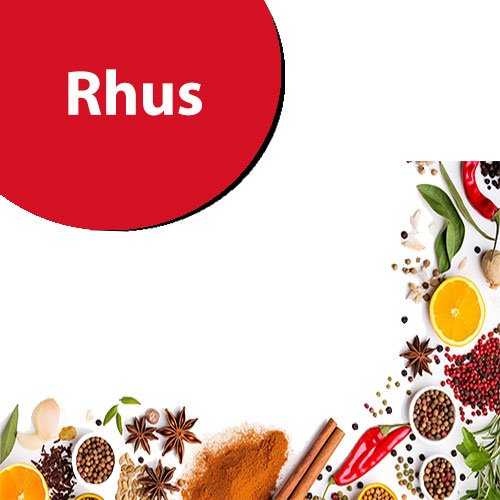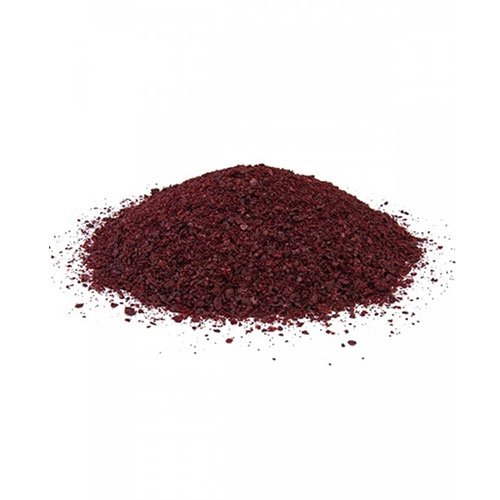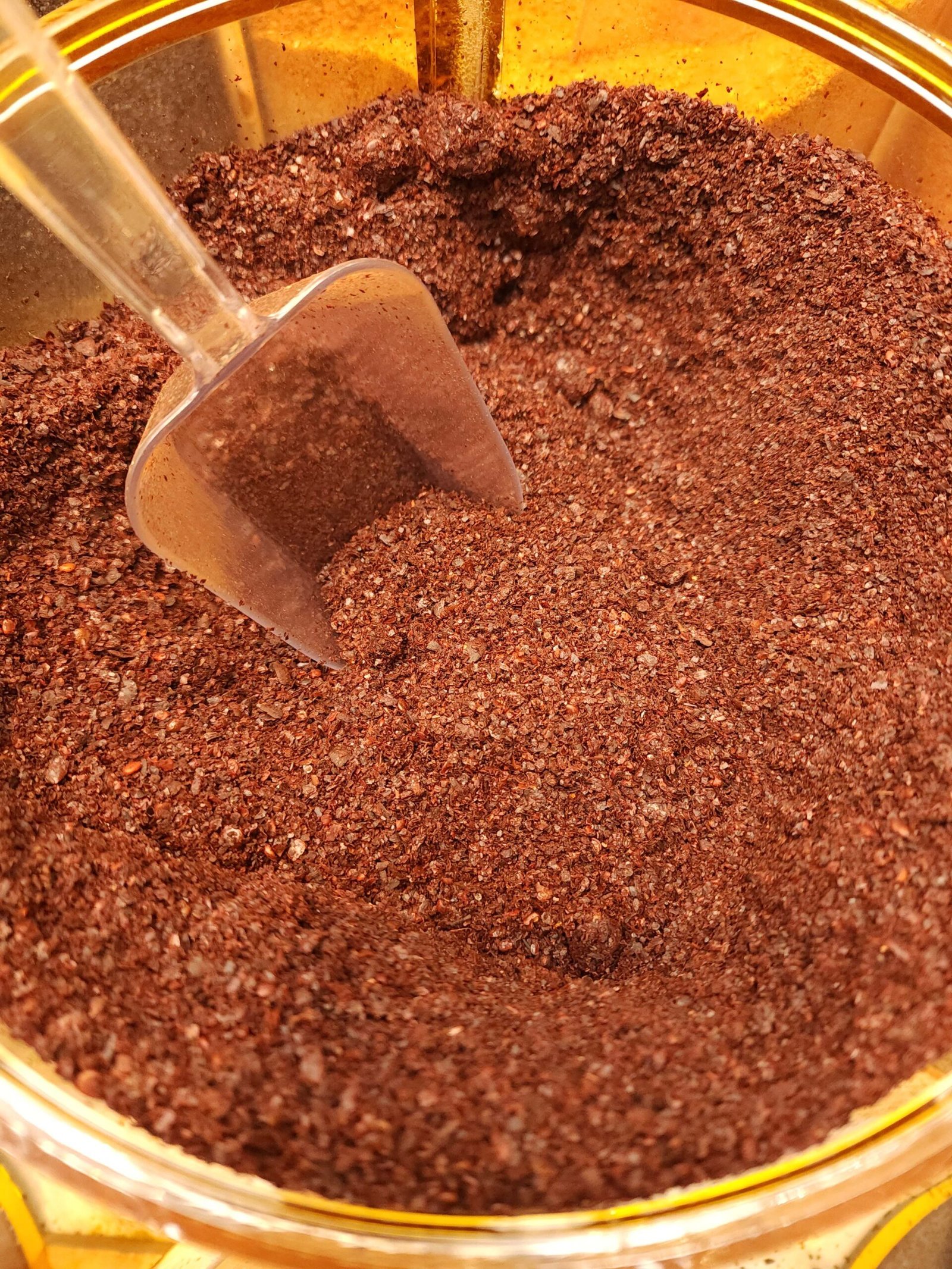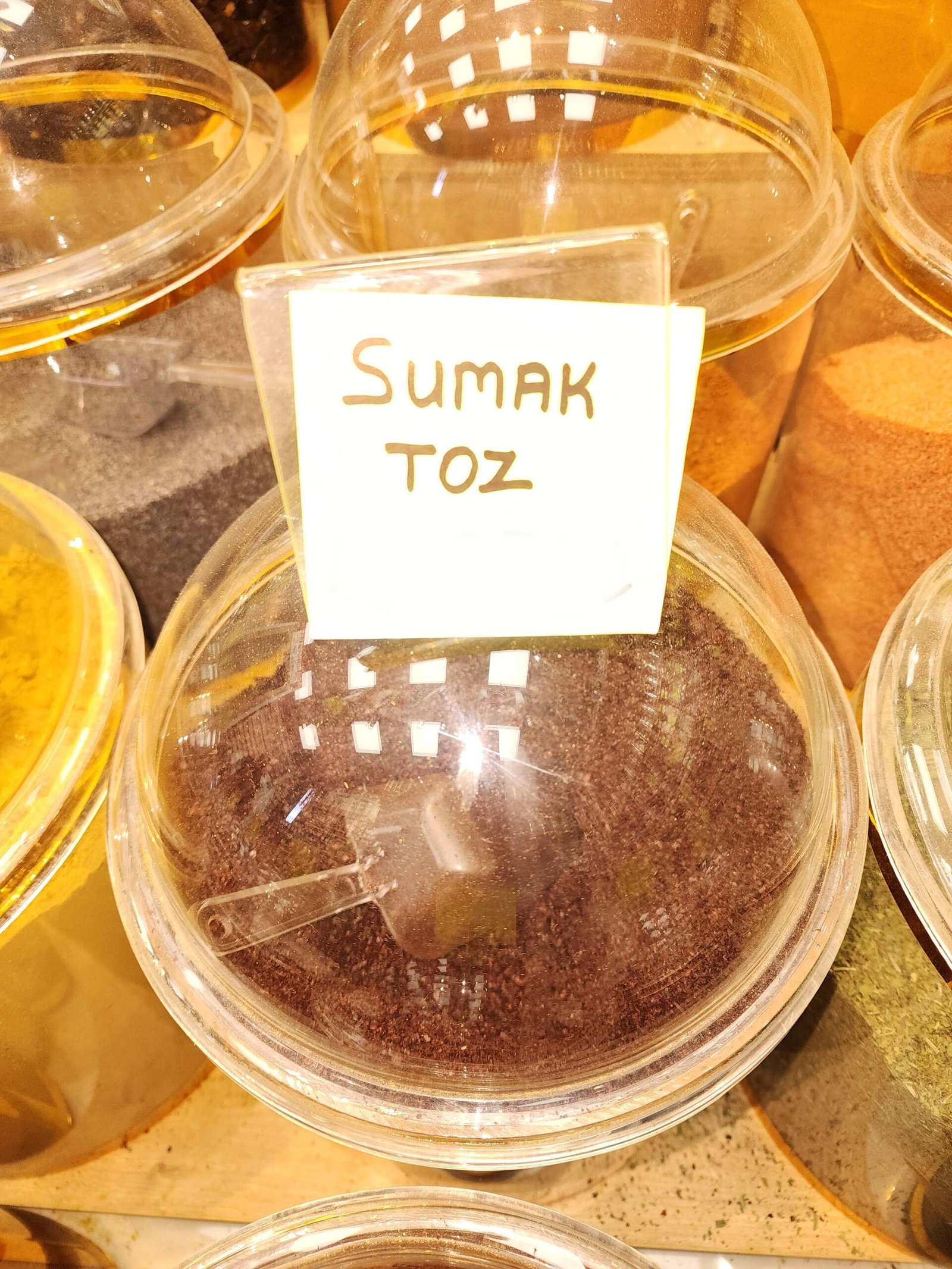Sumac & Rhus Coriaria – Organic
Sumac: Sumac is a reddish or purplish spice used in many different dishes and cuisines. The fruit of the sumac plant is dried and ground into a powder or sometimes used directly in recipes. Sumac is commonly used in Middle Eastern, Mediterranean, and South Asian cuisines. Here is more information about sumac: Flavor and Aroma: Sumac has a sharp, tangy taste and often imparts a mild lemony or sour flavor to dishes. It is frequently used as a souring agent in various culinary applications.
Uses: Sumac is used to add flavor to salads, soups, appetizers, meat dishes, rice, and even some beverages (such as sumac tea).
Colorant: Sumac gives dishes their characteristic reddish or purplish color, enhancing their visual appeal.
Antioxidants: Sumac is a rich source of antioxidants and may have potential health benefits, largely due to the presence of anthocyanins. Lemon Substitute: Sumac can be used as a substitute for lemon or lemon juice in some dishes, especially in recipes like kebabs or chicken dishes.
Spice Blends: Sumac is a component of certain spice blends (such as za’atar) and imparts a unique flavor to these mixtures.
Natural Dye: Traditionally, sumac has been used as a textile dye to give fabrics a reddish color.
Sumac holds a significant place in Middle Eastern cuisine and adds a distinct taste and color to many recipes. It is known for its unique flavor profile and is used to impart a special taste to dishes. Sumac is also valued for its potential health benefits, thanks to its antioxidant content.
The nutritional value of sumac can vary depending on its form and preparation, but here are approximate values for 1 tablespoon (about 5 grams) of ground sumac:
Calories: Approximately 15 calories
Total Fat: Less than 1 gram
Carbohydrates: Approximately 3 grams
Dietary Fiber: Approximately 1 gram
Protein: Less than 1 gram
Vitamins and Minerals:
Vitamin C: Approximately 3 milligrams (5% of the Daily Value)
Vitamin K: Approximately 1 microgram (1% of the Daily Value)
Calcium: Approximately 10 milligrams (1% of the Daily Value)
Iron: Approximately 0.2 milligrams (1% of the Daily Value)
Potassium: Approximately 67 milligrams (2% of the Daily Value)
Please note that these values are approximate and can vary depending on the specific product and how it’s prepared. Sumac is not typically consumed in large quantities, so its contribution to daily nutrient intake is relatively small. However, it is valued for its unique flavor and the potential health benefits associated with its antioxidant content. Sumac is often used as a seasoning or garnish, so it can enhance the taste of dishes without significantly impacting calorie or nutrient intake.
Organic Dry Sumac Powder
What is sumac?
Sumac; It is a type of spice obtained from the fruits of the Rhus plant, also called sumac tree. This plant, whose fruits are red and spherical in shape, has a sour taste. The plant, also known as sumac tree, has a shrub appearance. Sumac, which is collected from its tree and dried using appropriate techniques, is usually mixed with salt and turned into powder and used as a spice. However, in some cultures, especially in the eastern and southeastern provinces, the sour-tasting water obtained by soaking sumac in hot water is used in dishes to give a sour flavor to dishes. Sumac, which is widely used in onion salads due to its odor-reducing effect, is frequently included in all kinds of salads and some dishes and appetizers. In addition to giving a unique and pleasant flavor to dishes, sumac is also a spice that is very beneficial for health. It is one of the food types that should be a part of a healthy diet due to its many positive effects on health, especially its anti-inflammatory and antioxidant effects. Sumac, a type of spice that is widely known and used in our country and the Middle East, is not very well known in Western culture, but it has gradually begun to be used as a result of its benefits identified as a result of scientific research.
Benefits of Sumac
Sumac is a very valuable plant with endless benefits. One of the most important reasons for this is that it has very strong antioxidant properties. A second positive aspect is its high vitamin and mineral content. Here are the benefits of sumac on human health:
It is an important antioxidant
Sumac has been known for its antioxidant properties for years and is a much more powerful antioxidant than many commonly used spices. In this way, it reduces free radicals circulating in the body and reduces the level of oxidative stress. Thanks to this positive effect, it provides a protective effect against all types of cancer by preventing cells from becoming cancerous. In addition, thanks to its antioxidant effect, it significantly reduces the possibility of contracting many types of chronic diseases, especially cardiovascular diseases.
It has anti-inflammatory properties
Sumac, which has anti-inflammatory properties, increases the power to fight infectious diseases that can be seen in the body, especially flu and colds. It helps reduce fever and provides milder relief from infectious diseases. The abundance of vitamin C in sumac, which strengthens the immune system, also supports this fight. At the same time, sumac is also very effective in reducing pain caused by various diseases.
Regulates Blood Sugar
Some scientific research shows that regular sumac consumption provides protection against or supports treatment of many chronic diseases. One of these is diabetes. Scientific research shows that sumac helps regulate blood sugar and also helps reduce problems caused by type 2 diabetes by reducing blood cholesterol levels. Many complications seen in type 2 diabetes patients develop due to high blood sugar levels for a long time. Therefore, in addition to the current treatment, it becomes possible to minimize all these complications with the blood sugar regulating effect of sumac consumption.
Protects Against Infections
It has been supported by scientific studies that sumac contributes to the elimination of infectious diseases by showing antifungal and antibacterial effects. It is known that it helps alleviate infections caused by microorganisms such as Salmonella Typhimurium and Aspergillus Flavus, which cause common infectious diseases, and eliminate the complications caused by these infections. In addition, consumption of sumac in the form of tea in infectious diseases that occur in the respiratory tract, especially in the throat area, helps prevent negativities such as sore throat and cough caused by the disease.
It has a diuretic effect
Sumac is a powerful diuretic. This means that it has a diuretic effect on the body. Thanks to this effect, sumac helps protect against urinary tract infections and reduces high blood pressure. At the same time, sumac supports the elimination of toxic substances accumulated in the body and should be consumed regularly to benefit from these benefits.













Customer reviews
Reviews
There are no reviews yet.
Write a customer review